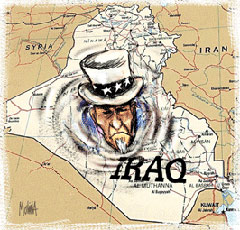 |
 |
 |
 Editorials | Environmental | March 2005 Editorials | Environmental | March 2005  
Iraq Invasion May Be Remembered as Start of the Age of Oil Scarcity
 Robert Collier - San Francisco Chronicle Robert Collier - San Francisco Chronicle


| Production tumbles in post-Hussein era as more countries vie for shrinking supplies.

|
Instead of inaugurating a new age of cheap oil, the Iraq war may become known as the beginning of an era of scarcity.

Two years ago, it seemed likely that Iraq, with the world's third-largest petroleum reserves, would become a hypercharged gusher once U.S. troops toppled Saddam Hussein. But chaos and guerrilla sabotage have slowed the flow of oil to a comparative trickle.

The price of crude on global markets hit an all-time record Friday, and oil experts say U.S. consumers are likely to keep feeling the pinch.

"Global supply hasn't kept up, and it isn't likely to in the near future, and one of the causes is Iraq," said John Lichtblau, chairman of the Petroleum Industry Research Foundation in New York.

The war coincided with the start of a sharp rise in oil imports by booming China and India, and experts say this alignment of factors may keep prices permanently high.

Iraq's oil production averaged about 3 million barrels a day before the war and now lags below 2 million, while prewar projections had pegged production to have hit at least 4 million by now. This missing production would have covered much of the annual growth in global oil demand, which is expected to increase by 1.8 million barrels a day this year, to 84.3 million barrels.

"If it weren't for the insurgency, Iraq would produce at least another million barrels day -- and maybe two," said Gal Luft, co-director of the Institute for the Analysis of Global Security in Washington. "Iraq is very much missing from the market, and it's one of the reasons why prices have risen so much."

Iraq has earned only about $31 billion from oil exports in the two years since the U.S. invasion, far below the prewar predictions by Deputy Defense Secretary Paul Wolfowitz, who claimed that Iraqi oil would generate $50 billion to $100 billion in the same period.

Foreign oil companies have withdrawn almost all their staff from Iraq because of the dangers. "The risk to operate there is a very serious risk, and it's not about to go away," Lichtblau said. "People are killed and kidnapped, and those pipelines are being blown up a week after they're repaired, again and again."

The companies are keeping their feet in the door. About 20 firms have provided free services to Iraq -- training for oil personnel, geological studies or other help -- as a way to maintain good contacts until things improve.

To make matters worse, there are few new sources of oil elsewhere. Russia is embroiled in the government confiscation of its biggest oil producer, Yukos; Nigeria's biggest oil region is riven by social conflict; Venezuela is in a worsening dispute with Washington; and the Organization of Petroleum Exporting Countries has no extra capacity to pump more crude.

"More and more people are realizing that the real story of Iraq, and more generally after 9/11, is our vulnerability as a nation to our dependence on imported foreign oil," said Frank Gaffney, president of the Center for Security Policy in Washington.

"The problem is access. Where do you go to find oil you do need to replace what you're producing? There aren't many alternatives," said Robert Ebel, director of the energy program at the Center for Strategic and International Studies in Washington. "And most countries have government oil companies -- they keep it for themselves, so you can't get in."

All these factors may be causing a sea change in attitudes among American politicians, some analysts say.

Fast-rising energy prices helped the Bush administration rally votes in Congress for its proposal to open the Arctic National Wildlife Refuge to oil and gas drilling. That proposal squeezed out a victory by a two-vote margin in the Senate last week. | 
 | |
 |



